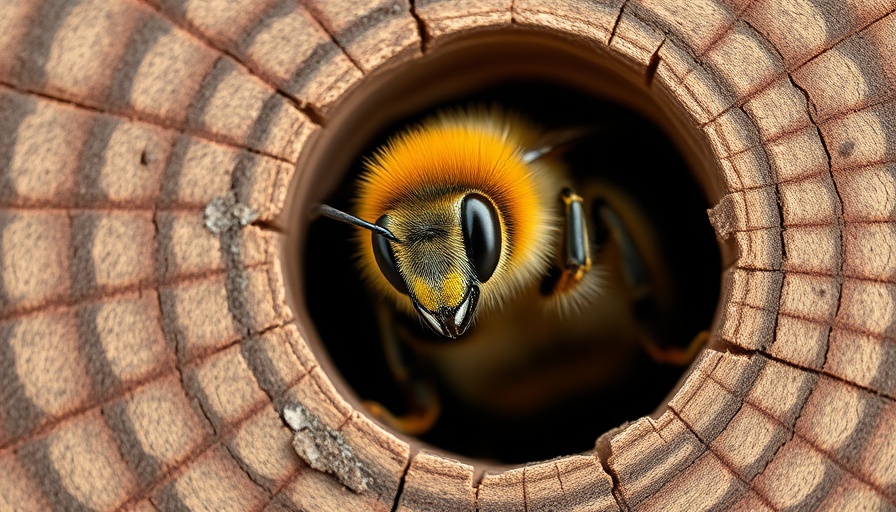
Bee Hotels: A Beacon for Native Pollinators in a World of Fire
The plight of wild pollinators is becoming increasingly dire. Declines in their populations have been observed globally, with climate change-fueled wildfires wreaking havoc on their habitats. Yet, there is a burgeoning hope on the horizon: bee hotels. Designed specifically for cavity-nesting species, these artificial nests can play a pivotal role in restoring native bee populations after devastating wildfires, according to recent research.
The Roots of the Problem: Climate Change and its Impact on Pollinators
Wildfires have become more prevalent and fierce due to anthropogenic climate change, leading to long-term risks for ecosystem health and biodiversity. While attention has often centered around plant recovery after bushfires, the animals responsible for pollinating those plants have been largely overlooked. This neglect, as pointed out by Dr. Kit Prendergast from the University of Southern Queensland, is alarming. "Native bees are often the key pollinators of wildflowers, so finding a practical way to support their recolonization and recovery after bushfires is crucial,” she emphasizes.
Bee Hotels Explained: What Are They and Why Do They Matter?
Bee hotels mimic natural nesting sites for various cavity-nesting species, providing a much-needed refuge for native bees. These structures can be easily installed in backyards, making them accessible for homeowners who wish to contribute to the recovery of local ecosystems. Dr. Prendergast's research, which involved constructing 1,000 bee hotels using both wooden blocks and PVC pipes, revealed their effectiveness in boosting local bee populations.
Success Stories from the Research
The implementation of bee hotels in five severely burned sites in Western Australia has yielded promising results. Over the span of seven months, surveys showcased that native bees occupied more than 800 nests in total across the locations. This significant number indicates that these hotels not only provided housing but also fostered an environment where native bees could flourish. In comparison, areas without bee hotels recorded much lower bee activity, underscoring the hotels' crucial role in habitat recovery.
The Competition: Native Bees vs. Honey Bees
A fascinating dynamic was noted during the research: the presence of honey bees affected the behavior of native bees. With honey bees being competitive for resources like nectar and pollen, their higher populations in certain areas led to decreased activity among native bees. This insight highlights the importance of managing honey bee populations to ensure that native bees have the room and resources necessary to thrive.
Why You Should Care: The Connection Between Pollinators and Your Garden
For property owners and potential buyers in Dumfries, understanding the link between healthy ecosystems and property value is essential. A landscape that is not only aesthetically pleasing but also biodiverse can enhance property appeal. Native pollinators, like the ones supported by bee hotels, contribute significantly to the health of local flora, thereby creating vibrant environments that can increase property desirability.
Actionable Insights: How to Support Native Bees
Integrating bee hotels into your garden can be a rewarding way to help local ecosystems. Here are some quick steps to get started:
- **Install Bee Hotels**: Choose spots away from heavy traffic and direct sunlight.
- **Plant Native Flowers**: Provide a food source that native bees prefer.
- **Reduce Pesticide Use**: This avoids harming bees and other beneficial insects.
By creating favorable conditions for native pollinators, homeowners can play an active role in supporting biodiversity and the recovery of local ecosystems.
The Future: Enhancing Pollinator Recovery Efforts
This new research on bee hotels opens avenues for future conservation efforts. As climate change continues to challenge native habitats, proactive steps can help support pollinator recovery more widely. Stakeholders, including homeowners and property investors, have a pivotal role in making environmentally-conscious choices that benefit not just their properties but the surrounding community.
In the face of climate change’s multifaceted challenges, small initiatives like bee hotels can create substantial impacts. If you’re committed to improving both your living space and the local environment, consider taking steps towards supporting our vital pollinators.
 Add Row
Add Row  Add
Add 





Write A Comment